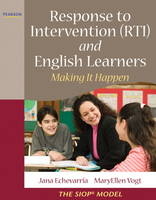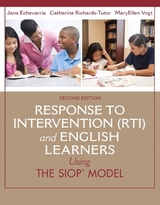
Response to Intervention (RTI) and English Learners
Pearson (Verlag)
978-0-13-704890-8 (ISBN)
- Titel erscheint in neuer Auflage
- Artikel merken
Response to Intervention (RTI) and English Learners: Making it Happen, written to assist teachers and administrators to better meet the needs of the increasing group of English Learner students in U.S. schools, includes background on Response to Intervention, explains the linguistic and academic issues that English Learners face, and covers appropriate and effective Tier 1, 2, and 3 interventions for English Learners using the eight components of the SIOP Model. The book provides use-tomorrow ideas and activities for implementing these eight components of the SIOP Model in an RTI framework; with special considerations and recommendations for aligning current practices in adolescent literacy with RTI programs for Secondary ELs. Even if educators are not familiar with the SIOP Model, they will find this as a useful resource.
Learn strategies for overcoming barriers and implementing an effective RTI process for English Learners (ELs) at Pearson's RTI for ELs Institute at www.siopinstitute.net.
Jana Echevarría is a Professor Emerita at California State University, Long Beach. She has taught in elementary, middle, and high schools in general education, special education, ESL, and bilingual programs. She has lived in Taiwan, Spain and Mexico. An internationally known expert on second language learners, Dr. Echevarría is a Fulbright Specialist. Her research and publications focus on effective instruction for English learners, including those with learning disabilities. Currently, she is Co-Principal Investigator with the Center for Research on the Educational Achievement and Teaching of English Language Learners (CREATE) funded by the U.S. Department of Education, Institute of Education Sciences (IES). In 2005, Dr. Echevarría was selected as Outstanding Professor at CSULB. MaryEllen Vogt, Ed.D., is Professor Emerita of Education at California State University, Long Beach. MaryEllen has been a classroom teacher, reading specialist, special education specialist, curriculum coordinator, and university teacher educator. She received her doctorate from the University of California, Berkeley, and is a co-author of fifteen books, including Reading Specialists and Literacy Coaches in the Real World (3rd ed., 2011) and the SIOP® book series. Her research interests include improving comprehension in the content areas, teacher change and development, and content literacy and language acquisition for English learners. She was inducted into the California Reading Hall of Fame, received her university’s Distinguished Faculty Teaching Award, and served as President of the International Reading Association in 2004—2005.
TABLE OF CONTENTS
PREFACE AND ACKNOWLEDGEMENTS
Chapter 1 WHAT IS RTI FOR ENGLISH LEARNERS?
RTI As An Opportunity
RTI Definition Unpackaged
Assessment and Intervention
Identify Areas of Concern and Monitor Progress
Provide Evidence-based Interventions
Identify Learning Disabilities
RTI Models
Standard Treatment Protocol
Problem-Solving Model
Hybrid Approaches
Making RTI Work
Final Thoughts
For Reflection and Discussion
Chapter 2 THE BIG PICTURE
Issues Faced by English Learners in School
Language Proficiency
Background Knowledge and Experience
Cultural Values and Norms
Factors Associated with Underachievement
Lack of Qualified Teachers
Inappropriate Teaching Practices
At-Risk School Environments
Factors Associated with Educational Success
High Expectations for All Students
Effective Teaching Practices
Relationships of Respect
RTI and Cultural and Linguistic Diversity
The Important Role of Parents
Why Don’t They Come?
What Can We Do?
Parents and RTI
Final Thoughts
For Reflection and Discussion
Chapter 3 TIER 1: WHAT IS BEST PRACTICE FOR TEACHING ENGLISH LEARNERS
An Overview of Tier 1: Effective Instruction for English Learners
Universal Screening in Tier 1
Progress Monitoring
Challenges in Tier 1 Universal Screening and Progress Monitoring for English Learners
High-Quality Classroom Instruction Making Content Comprehensible for English
Learners: The SIOP Model
Components of the SIOP Model
Lesson Preparation
Research Support for the Lesson Preparation Component
Building Background
Research Support for the Building Background Component
Comprehensible Input
Research Support for the Comprehensible Input Component
Strategies
Research Support for the Strategies Component
Interaction
Research Support for the Interaction Component
Practice and Application
Research Support for the Practice and Application Component
Lesson Delivery
Research Support for the Lesson Delivery Component
Review and Assessment
Research Support for the Review and Assessment Component
Uses and Benefits of the SIOP Model
Differentiated Instruction
A Glimpse Into a Classroom with High-Quality Instruction for English Learners
Final Thoughts
For Reflection and Discussion
Chapter 4 TIER 2 INTERVENTIONS FOR ENGLISH LEARNERS by Catherine Richards
Using Data to Select Students in Need of Intervention
Curriculum-Based Measurements (CBM)
An Example of a Tier 2 Intervention Process at the Elementary School Level
Grouping Students in Small Groups for Intervention
Conducting Small Group Intervention
Content of Intervention
Methods of Delivering Instruction
Monitoring Student Progress
Reflecting on Data and Making Decisions
Final Thoughts
For Reflection and Discussion
Chapter 5 TIER 3 INTERVENTIONS FOR ENGLISH LEARNERS
What is Different About Tier 3?
Identifying a Disability
A Learning Disability is Hard to Define
Distinguishing Disability from Difference
Successful IEP Meetings
Final Thoughts
For Reflection and Discussion
Chapter 6 SPECIAL CONSIDERATIONS FOR SECONDARY ENGLISH LEARNERS
Literacy Issues for Secondary English Learners
Why Do Secondary English Learners (and Other Students) Struggle with Reading
and Writing
Implementation of RTI for English Learners at the Secondary Level
What Adolescent English Learners Need and Deserve: Effective Tier 1 Instruction
Secondary RTI for English Learners: Putting It All Together
Final Thoughts
For Reflection and Discussion
Chapter 7 SUCCESSES AND BARRIERS TO EFFECTIVE RTI IMPLEMENTATION
Principles of a Successful RTI Program
Questions to Guide RTI with English Learners
Frequently Asked Questions
Final Thoughts
| Erscheint lt. Verlag | 27.8.2010 |
|---|---|
| Sprache | englisch |
| Maße | 274 x 216 mm |
| Gewicht | 340 g |
| Themenwelt | Schulbuch / Wörterbuch ► Wörterbuch / Fremdsprachen |
| Geisteswissenschaften ► Sprach- / Literaturwissenschaft ► Sprachwissenschaft | |
| Sozialwissenschaften ► Pädagogik ► Berufspädagogik | |
| Sozialwissenschaften ► Pädagogik ► Schulpädagogik / Grundschule | |
| ISBN-10 | 0-13-704890-4 / 0137048904 |
| ISBN-13 | 978-0-13-704890-8 / 9780137048908 |
| Zustand | Neuware |
| Informationen gemäß Produktsicherheitsverordnung (GPSR) | |
| Haben Sie eine Frage zum Produkt? |
aus dem Bereich



